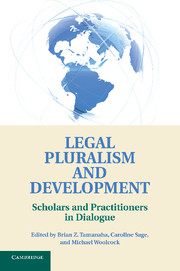
-
Select format
-
- Publisher:
- Cambridge University Press
- Publication date:
- 05 June 2012
- 28 May 2012
- ISBN:
- 9781139094597
- 9781107019409
- 9781107690905
- Dimensions:
- (228 x 152 mm)
- Weight & Pages:
- 0.48kg, 270 Pages
- Dimensions:
- (229 x 152 mm)
- Weight & Pages:
- 0.35kg, 272 Pages
- Subjects:
- Socio-Legal Studies, Law and Economics, Law
You may already have access via personal or institutional login- Subjects:
- Socio-Legal Studies, Law and Economics, Law
Book description
Previous efforts at legal development have focused almost exclusively on state legal systems, many of which have shown little improvement over time. Recently, organizations engaged in legal development activities have begun to pay greater attention to the implications of local, informal, indigenous, religious and village courts or tribunals, which often are more efficacious than state legal institutions, especially in rural communities. Legal pluralism is the term applied to these situations because these institutions exist alongside official state legal systems, usually in a complex or uncertain relationship. Although academics, especially legal anthropologists and sociologists, have discussed legal pluralism for decades, their work has not been consulted in the development context. This book brings together, in a single volume, contributions from academics and practitioners to explore the implications of legal pluralism for legal development.
Reviews
'This is an excellent edited collection of papers that moves forward a number of longstanding debates within legal pluralism as today’s scholars and practitioners increasingly focus on its practical implications for legal reform. Although the contributions are written as stand-alone chapters, the richness of the debate that runs through all the papers means that the reader will benefit much from reading the book from cover to cover.'
Helen Dancer Source: Journal of Legal Pluralism
Contents
Metrics
Altmetric attention score
Full text views
Full text views help Loading metrics...
Loading metrics...
* Views captured on Cambridge Core between #date#. This data will be updated every 24 hours.
Usage data cannot currently be displayed.
Accessibility standard: Unknown
Why this information is here
This section outlines the accessibility features of this content - including support for screen readers, full keyboard navigation and high-contrast display options. This may not be relevant for you.
Accessibility Information
Accessibility compliance for the PDF of this book is currently unknown and may be updated in the future.


